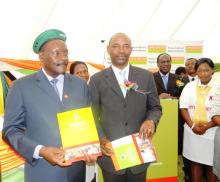Zimbabwe launches Accelerated VMMC strategic plan
Marondera, 2015 Zimbabwe has mounted an effective response to the HIV epidemic, and HIV prevalence has come down from 27% in 1997 to 15% to date. In addition to the prevention and treatment interventions that have been deployed, voluntary medical male circumcision (VMMC) is a high impact intervention that has been adopted, which has the potential to to drive further dramatic declines in the trajectory of HIV in Zimbabwe. Zimbabwe, which has a historically low prevalence of male circumcision stands to benefit significantly from adopting VMMC because randomized control trials showed compelling evidence that VMMC reduces the risk of female to male transmission of HIV through sexual intercourse by up to 60%.
It is against this background that Zimbabwe has extended the accelerated scale up to 2018, targeting 1.3 million males between 13 and 29 years of age. The accelerated strategic and operational plan launched today is a roadmap for accelerating scale up of services for Zimbabwe to achieve the set national targets.
Speakers at the launch all emphasised that scaling up of VMMC is critically important to reduce the future burden of HIV as it offers excellent value for money by averting new HIV infections and reducing the number of people needing HIV treatment and care. In a statement to launch the accelerated strategic plan, the Minister of Health and Child Care, Dr David Parirenyatwa said Zimbabwe’s strategic goal for VMMC is to contribute to the reduction of HIV incidence by scaling up VMMC to reach 80% of HIV negative men between 13—29 years by 2018. He urged all uncircumcised men to visit their nearest health centers and join the band wagon. Dr Parirenyatwa also cautioned circumcised men not to engage in risky sexual behavior because they are “protected”. “Circumcision is not a ticket to promiscuity, continue practicing safe sex because it does not offer 100% protection,” said Dr Parirenyatwa.
In his statement, the WHO Representative, Dr David Okello said that WHO has, since 2007, recommended VMMC as an additional important strategy for HIV prevention, particularly in settings with high HIV prevalence and low levels of male circumcision, where the public health benefits will be maximized . He congratulated the Ministry of Health and Child Care for successfully launching the Accelerated VMMC Operational Plan 2014-2018 and pledged WHO’s support in developing a robust framework: guidelines, policies and a comprehensive adverse event surveillance system which is crucially necessary to identify factors that could improve the safety of procedures.





